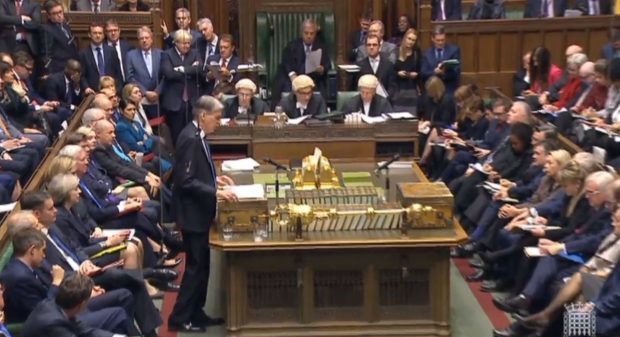Philip Hammond has said the Brexit vote underlined the “urgent” need to tackle the UK economy’s long-term weaknesses as the Budget watchdog slashed growth forecasts for next year.
The Chancellor, delivering his first Autumn Statement, said the economy had so far “confounded commentators” with its “strength and resilience”.
But he revealed the Office for Budget Responsibility had downgraded growth forecasts for next year from 2.2% to 1.4% as a result of the uncertainty caused by the Brexit vote and higher inflation due to the fall in sterling.
Mr Hammond told MPs: “That’s slower, of course, than we would wish, but still equivalent to the IMF’s forecast for Germany, and higher than the forecast for growth in many of our European neighbours, including France and Italy.”
The Chancellor said the June 23 vote to leave the European Union will “change the course of Britain’s history” and “makes more urgent than ever the need to tackle our economy’s long-term weaknesses” including the productivity gap.
The OBR forecast growth this year to be 2.1%, higher than the 2% forecast in March, but it will fall to 1.4% next year before recovering to 1.7% in 2018, 2.1% in 2019 and 2020 then 2% in 2021.
Mr Hammond confirmed he was abandoning predecessor George Osborne’s aim of achieving a budget surplus by 2019/20 as he acknowledged the decline in growth would have an impact on the public finances.
He told MPs Government borrowing would hit £68.2 billion this year and £59 billion next year compared with the March forecast of £55.5 billion and £38.8 billion.
Explaining why he was abandoning Mr Osborne’s target, Mr Hammond told MPs: “In view of the uncertainty facing the economy, and in the face of slower growth forecasts, we no longer seek to deliver a surplus in 2019-20.
“But the Prime Minister and I remain firmly committed to seeing the public finances return to balance as soon as practicable, while leaving enough flexibility to support the economy in the near term.”
His new draft Charter for Budget Responsibility would commit the Government to returning the public finances to balance “as early as possible in the next parliament”.
In the interim, borrowing should be below 2% and public sector net debt should be falling as a share of GDP by the end of the parliament in 2020.
Welfare spending would be kept within a cap set by the Government and monitored by the OBR, he added.
Mr Hammond set out a range of tax hikes, including a crackdown on “unfair” salary sacrifice schemes which are used to reduce levies on employee benefits.
From April 2017 Mr Hammond said he would align the employee and employer National Insurance thresholds at £157 per week, costing firms up to £7.18 a year for each worker.
He also announced a hike from 10% to 12% in insurance premium tax from next year.
Announcing a squeeze on salary sacrifice schemes, Mr Hammond said: “The Government will take action now to reduce the difference between the treatment of cash earnings and benefits.
“The majority of employees pay tax on a cash salary. But some are able to sacrifice salary and pay much lower tax on benefits in kind.
“This is unfair, and so from April 2017 employers and employees who use these schemes will pay the same taxes as everyone else.”
Mr Hammond also announced a further crackdown on tax dodges as part of a crackdown aimed at raising around £2 billion over the Autumn Statement forecast period.
Confirming that Whitehall spending squeezes will continue, Mr Hammond said plans set out in 2015 would remain in place.
The £3.5 billion of efficiency savings announced at the Budget are to be delivered in full, but departments which meet their targets would be able to reinvest £1 billion of efficiency savings in priority areas in 2019/20.
